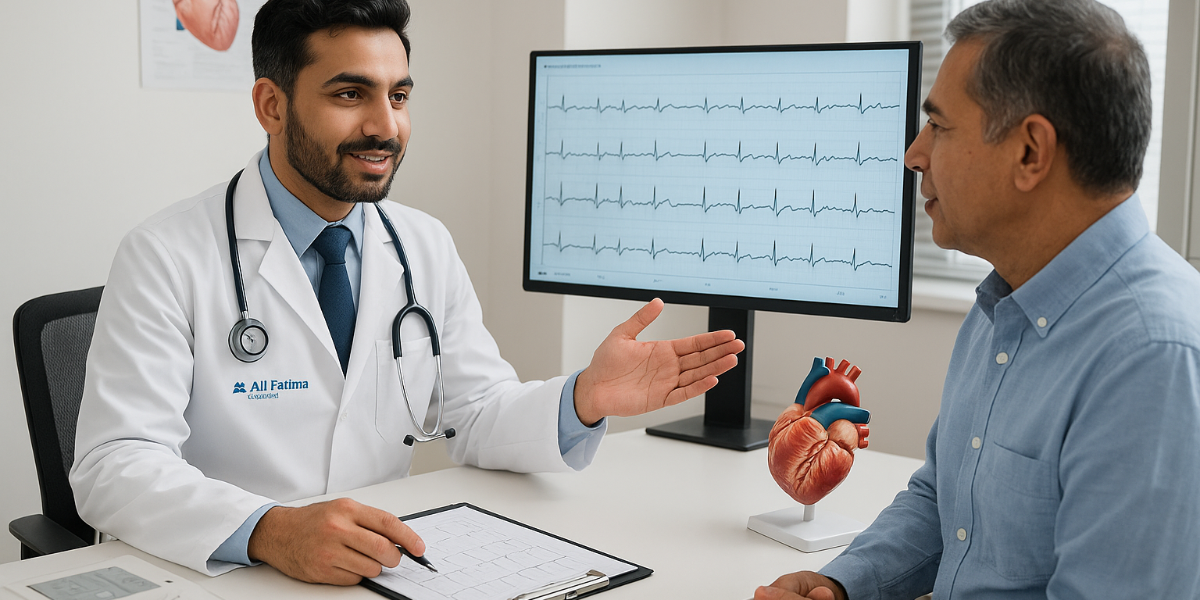
Early Signs of Heart Disease You Shouldn’t Ignore
Introduction
Heart disease remains one of the leading causes of death globally — and Pakistan is no exception. According to the Pakistan Cardiac Society, cardiovascular diseases account for nearly one-third of all deaths in the country. What makes this even more concerning is that many people don’t recognize the early warning signs until it’s too late.
At Ali Fatima Hospital (AFH), our cardiology experts emphasize that timely detection and lifestyle modification can prevent severe heart conditions. Understanding the symptoms and acting early can save lives — including your own.
Understanding Heart Disease
Heart disease is a broad term that covers several conditions affecting the heart and blood vessels. The most common types include:
- Coronary Artery Disease (CAD): Blockage of arteries due to cholesterol buildup.
- Arrhythmia: Irregular heartbeat or abnormal rhythm.
- Heart Failure: When the heart cannot pump blood efficiently.
- Heart Valve Disease: Damage or defect in one of the four heart valves.
These conditions often develop silently, but certain warning signs can appear months or even years before a major cardiac event like a heart attack.
1. Chest Discomfort or Pain
The most well-known symptom of heart disease is chest pain (angina). It may feel like pressure, tightness, or squeezing in the chest that occurs during physical activity or emotional stress.
When to Take It Seriously
- If the pain radiates to your left arm, neck, jaw, or back.
- If it lasts more than a few minutes or comes and goes repeatedly.
- If it’s accompanied by shortness of breath, sweating, or nausea.
Never ignore chest discomfort. Even mild or occasional pain can be an early sign of coronary artery disease.
2. Shortness of Breath
If you find yourself getting winded easily during light activity or while resting, it could indicate your heart isn’t pumping efficiently. Shortness of breath can be caused by fluid buildup in the lungs — a common sign of heart failure.
Many people mistake it for being out of shape or aging, but if it’s new or worsening, consult a cardiologist immediately.
3. Fatigue and Weakness
Feeling unusually tired or weak, even after getting enough rest, can be an early sign that your heart is struggling. When the heart doesn’t pump enough oxygen-rich blood to tissues, the body compensates by reducing energy levels.
Persistent fatigue — especially in women — is often overlooked as a heart disease symptom. It’s crucial to notice patterns of extreme tiredness not explained by other causes.
4. Swelling in Feet, Ankles, or Legs
Swelling (edema) in the lower body parts may indicate that your heart isn’t pumping blood effectively, causing fluid buildup. This is a classic symptom of congestive heart failure.
If your shoes feel tighter or your ankles swell without reason, it’s best to get a heart evaluation.
5. Irregular Heartbeat (Palpitations)
A fluttering, racing, or pounding heartbeat may signal an arrhythmia — an irregular rhythm that can lead to serious complications if untreated.
While occasional palpitations may result from stress or caffeine, frequent or prolonged episodes should be checked immediately. Some arrhythmias can increase the risk of stroke or sudden cardiac arrest.
6. Dizziness or Fainting
Feeling dizzy or lightheaded could mean a drop in blood pressure caused by a weak heart or irregular rhythm. In severe cases, patients may faint due to a temporary lack of blood flow to the brain.
If dizziness occurs frequently, especially when standing up or exerting yourself, it’s time to visit a cardiologist.
7. Pain in the Arm, Neck, Jaw, or Back
Heart pain isn’t always felt in the chest. For some people — particularly women — symptoms may appear as pain or pressure in the arm, shoulder, jaw, or upper back.
This “referred pain” happens because nerves connected to the heart also connect to other parts of the body, causing confusing sensations. Recognizing these signs early can help prevent a heart attack.
8. Persistent Cough or Wheezing
A chronic cough that produces white or pink mucus could be a sign of fluid buildup in the lungs due to heart failure. It may worsen when lying flat and improve when sitting up.
If you experience this alongside breathlessness or swelling, it’s best to undergo a thorough cardiac evaluation.
9. Nausea, Indigestion, or Stomach Pain
Some people, especially women, experience indigestion, heartburn, or stomach discomfort during heart problems. These symptoms occur when the heart’s reduced blood flow affects the digestive system.
If nausea or abdominal pain occurs with fatigue or chest pressure, don’t dismiss it as a digestive issue — it might be cardiac-related.
10. Sudden Sweating (Cold Sweat)
Breaking into a cold sweat without physical exertion is a red flag for heart trouble. The body goes into “fight or flight” mode during a heart attack, releasing stress hormones that cause sweating.
If sweating occurs with chest tightness or shortness of breath, seek emergency help immediately.
Why Early Detection Matters
Heart disease often progresses silently, but early intervention can stop or reverse damage. Regular heart checkups, ECGs, echocardiograms, and cholesterol screenings are essential, especially for people with risk factors like:
- High blood pressure
- High cholesterol
- Diabetes
- Smoking
- Family history of heart disease
- Obesity and sedentary lifestyle
At Ali Fatima Hospital’s Cardiology Department, we use advanced diagnostic tools and imaging technology to detect cardiac conditions at their earliest stages.
👉 Visit our Cardiology Department for expert consultation and preventive care.
Preventive Measures to Keep Your Heart Healthy
Heart health depends on daily habits as much as on medical care. Here’s what you can do:
- Eat a balanced diet rich in fruits, vegetables, and whole grains.
- Avoid processed and high-cholesterol foods.
- Exercise for at least 30 minutes a day.
- Quit smoking and limit alcohol consumption.
- Manage stress through relaxation techniques and proper sleep.
- Keep your blood sugar, pressure, and cholesterol in check.
Prevention is not just better than cure — it’s often the only cure when it comes to heart health.
Conclusion
Your heart speaks — sometimes quietly, sometimes urgently. Recognizing early symptoms of heart disease can mean the difference between timely treatment and a life-threatening event.
At Ali Fatima Hospital, our dedicated team of cardiologists, nurses, and diagnostic specialists provides personalized heart care — from prevention and early detection to advanced treatment. If you experience any of the symptoms discussed above, don’t wait — your heart deserves immediate attention and care.
Relevant Blogs
Get in touch with us today to get medical services
Copyright 2026. All Rights Reserved By AFH





